Module 8 Story time Unit2 Goldilocks hurried out of the house.同步测试卷(含解析)
文档属性
| 名称 | Module 8 Story time Unit2 Goldilocks hurried out of the house.同步测试卷(含解析) |
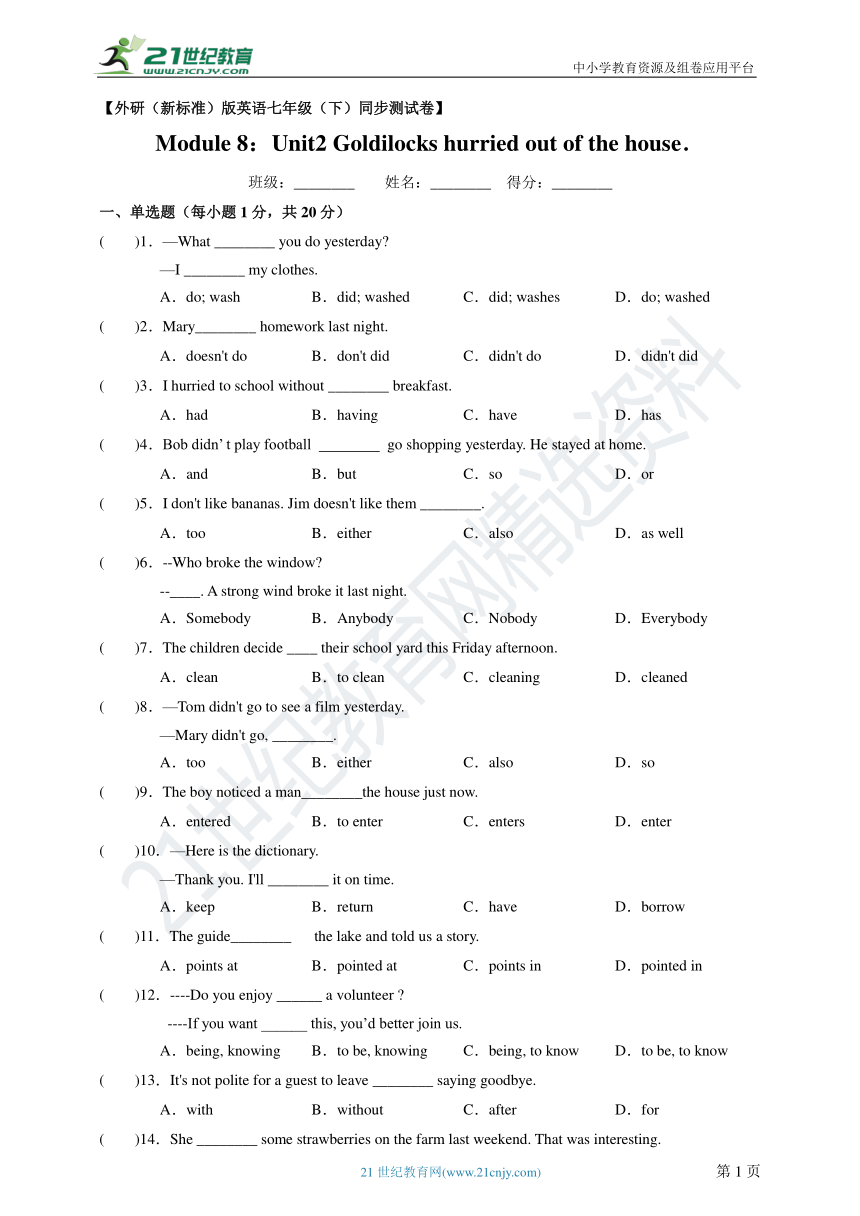
|
|
| 格式 | zip | ||
| 文件大小 | 911.6KB | ||
| 资源类型 | 试卷 | ||
| 版本资源 | 外研版 | ||
| 科目 | 英语 | ||
| 更新时间 | 2020-05-03 00:00:00 | ||
图片预览

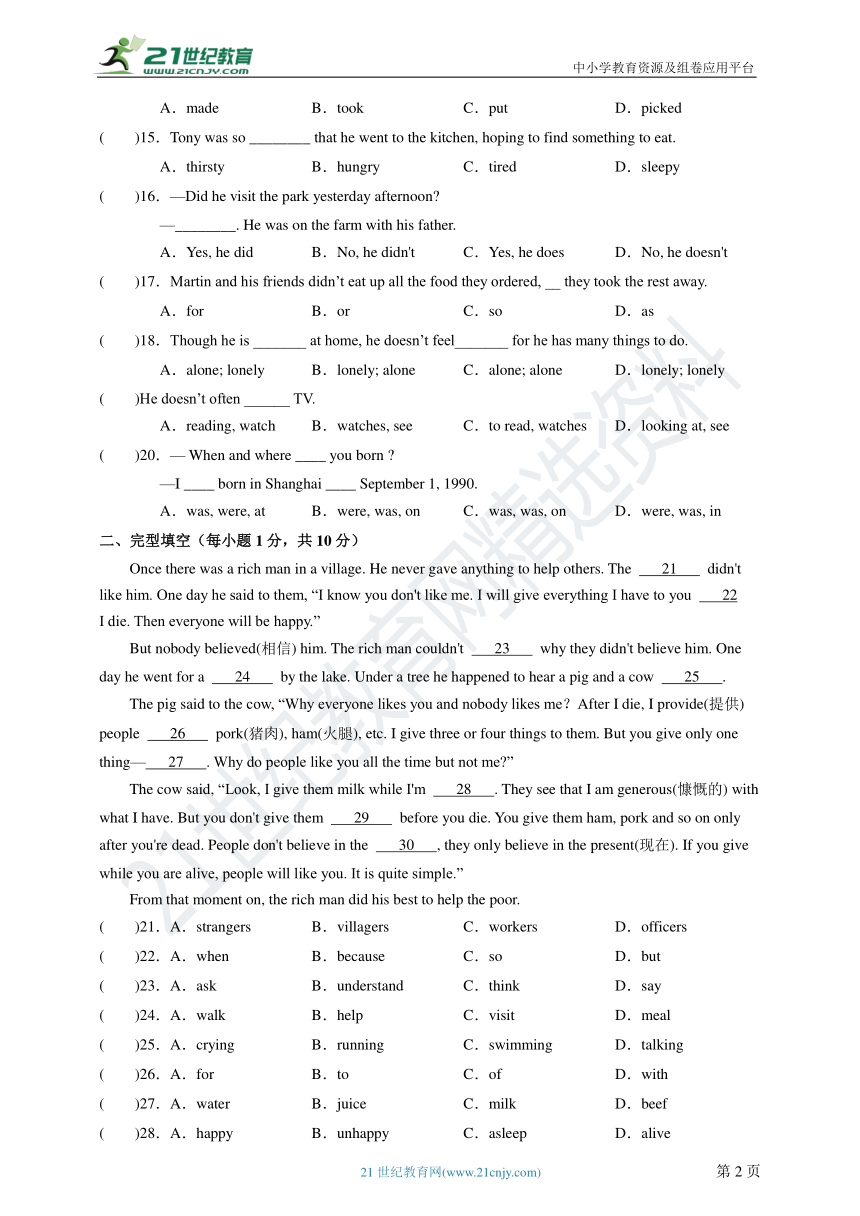
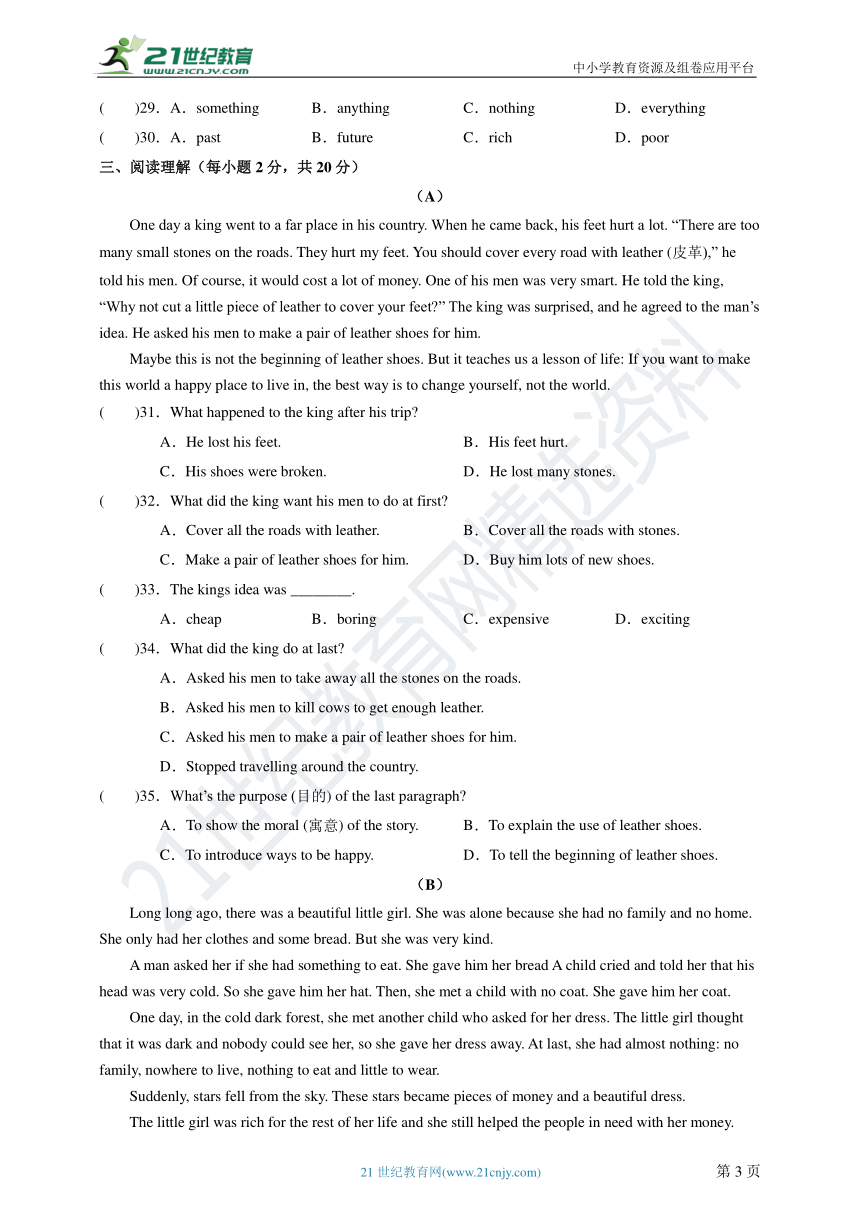
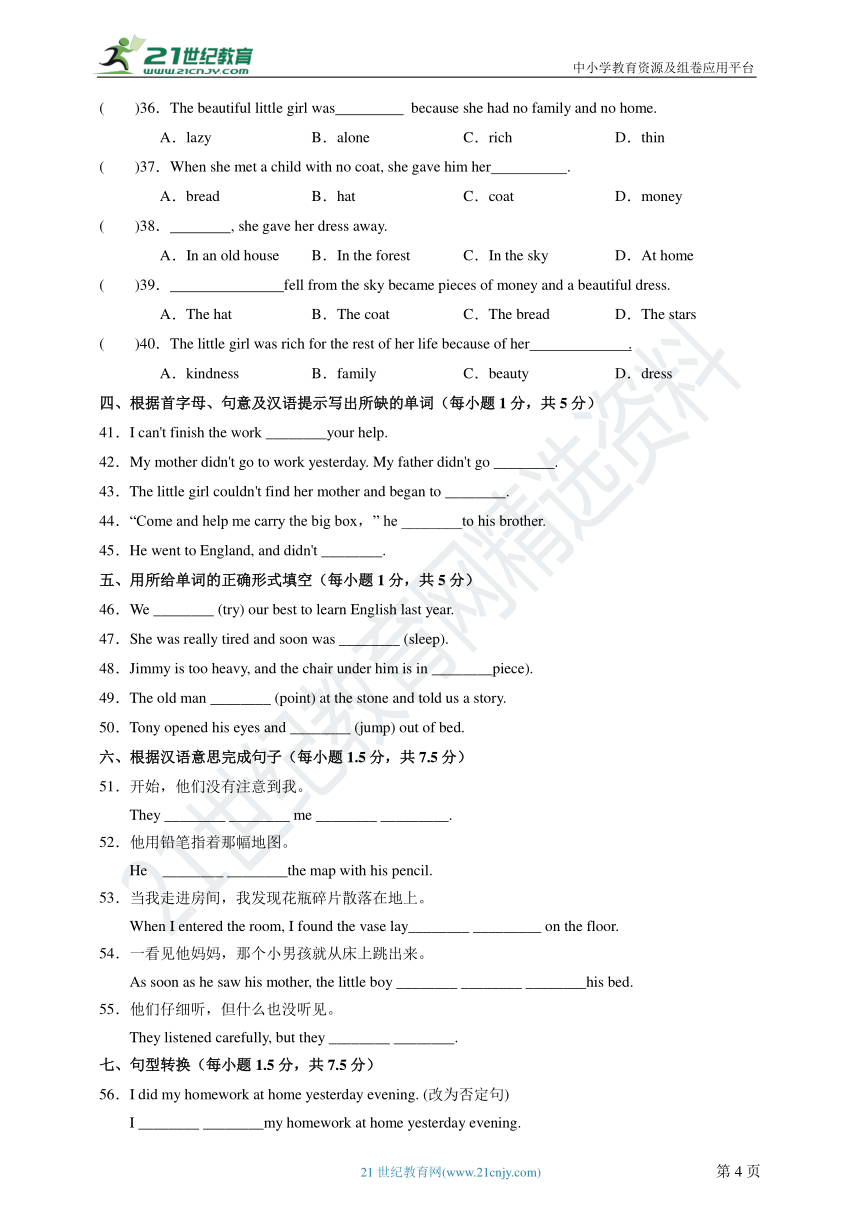
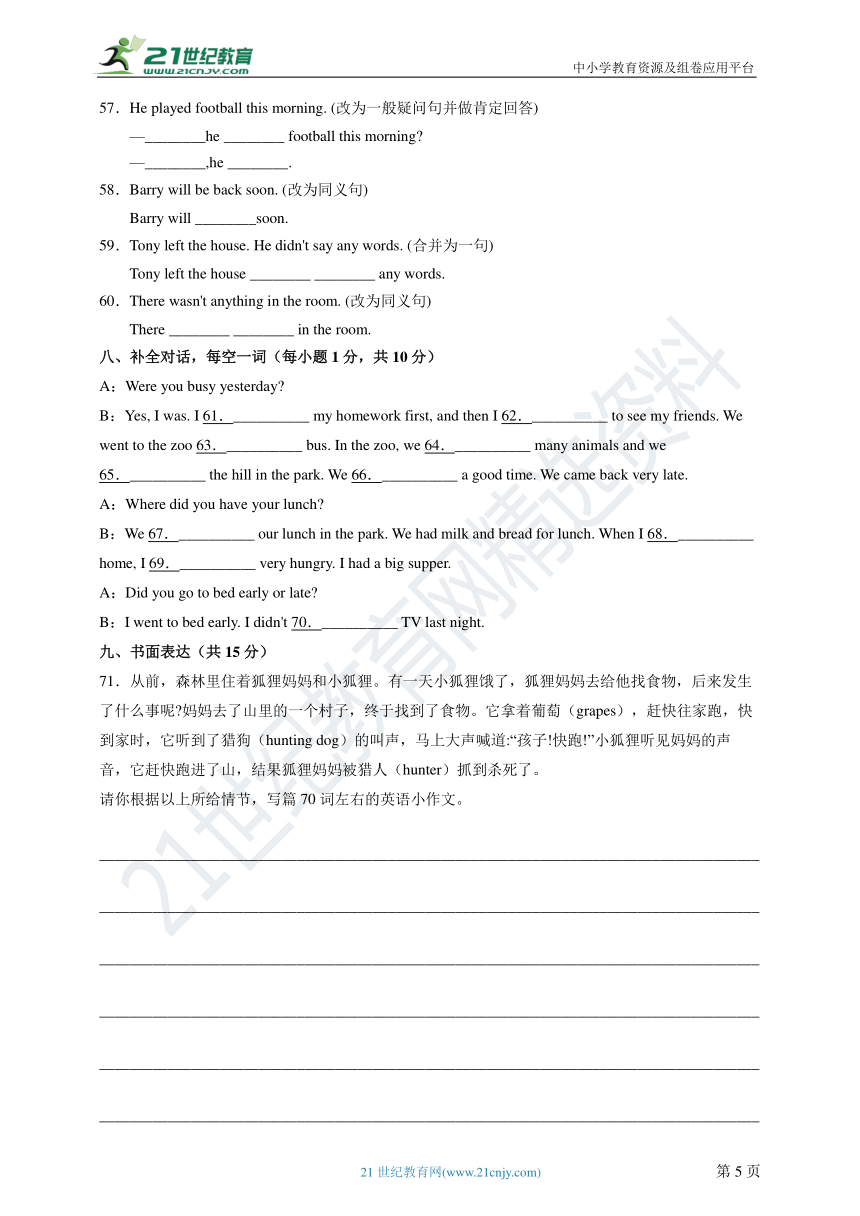
文档简介
【外研(新标准)版英语七年级(下)同步测试卷】
Module 8:Unit2 Goldilocks hurried out of the house.
班级:________ 姓名:________ 得分:________
一、单选题(每小题1分,共20分)
( )1.—What ________ you do yesterday?
—I ________ my clothes.
A.do; wash B.did; washed C.did; washes D.do; washed
( )2.Mary________ homework last night.
A.doesn't do B.don't did C.didn't do D.didn't did
( )3.I hurried to school without ________ breakfast.
A.had B.having C.have D.has
( )4.Bob didn’ t play football go shopping yesterday. He stayed at home.
A.and B.but C.so D.or
( )5.I don't like bananas. Jim doesn't like them ________.
A.too B.either C.also D.as well
( )6.--Who broke the window?
--____. A strong wind broke it last night.
A.Somebody B.Anybody C.Nobody D.Everybody
( )7.The children decide ____ their school yard this Friday afternoon.
A.clean B.to clean C.cleaning D.cleaned
( )8.—Tom didn't go to see a film yesterday.
—Mary didn't go, ________.
A.too B.either C.also D.so
( )9.The boy noticed a man________the house just now.
A.entered B.to enter C.enters D.enter
( )10.—Here is the dictionary.
—Thank you. I'll ________ it on time.
A.keep B.return C.have D.borrow
( )11.The guide________ the lake and told us a story.
A.points at B.pointed at C.points in D.pointed in
( )12.----Do you enjoy ______ a volunteer ?
----If you want ______ this, you’d better join us.
A.being, knowing B.to be, knowing C.being, to know D.to be, to know
( )13.It's not polite for a guest to leave ________ saying goodbye.
A.with B.without C.after D.for
( )14.She ________ some strawberries on the farm last weekend. That was interesting.
A.made B.took C.put D.picked
( )15.Tony was so ________ that he went to the kitchen, hoping to find something to eat.
A.thirsty B.hungry C.tired D.sleepy
( )16.—Did he visit the park yesterday afternoon?
—________. He was on the farm with his father.
A.Yes, he did B.No, he didn't C.Yes, he does D.No, he doesn't
( )17.Martin and his friends didn’t eat up all the food they ordered, __ they took the rest away.
A.for B.or C.so D.as
( )18.Though he is _______ at home, he doesn’t feel_______ for he has many things to do.
A.alone; lonely B.lonely; alone C.alone; alone D.lonely; lonely
( )He doesn’t often ______ TV.
A.reading, watch B.watches, see C.to read, watches D.looking at, see
( )20.— When and where ____ you born ?
—I ____ born in Shanghai ____ September 1, 1990.
A.was, were, at B.were, was, on C.was, was, on D.were, was, in
二、完型填空(每小题1分,共10分)
Once there was a rich man in a village. He never gave anything to help others. The 21 didn't like him. One day he said to them, “I know you don't like me. I will give everything I have to you 22 I die. Then everyone will be happy.”
But nobody believed(相信) him. The rich man couldn't 23 why they didn't believe him. One day he went for a 24 by the lake. Under a tree he happened to hear a pig and a cow 25 .
The pig said to the cow, “Why everyone likes you and nobody likes me?After I die, I provide(提供) people 26 pork(猪肉), ham(火腿), etc. I give three or four things to them. But you give only one thing— 27 . Why do people like you all the time but not me?”
The cow said, “Look, I give them milk while I'm 28 . They see that I am generous(慷慨的) with what I have. But you don't give them 29 before you die. You give them ham, pork and so on only after you're dead. People don't believe in the 30 , they only believe in the present(现在). If you give while you are alive, people will like you. It is quite simple.”
From that moment on, the rich man did his best to help the poor.
( )21.A.strangers B.villagers C.workers D.officers
( )22.A.when B.because C.so D.but
( )23.A.ask B.understand C.think D.say
( )24.A.walk B.help C.visit D.meal
( )25.A.crying B.running C.swimming D.talking
( )26.A.for B.to C.of D.with
( )27.A.water B.juice C.milk D.beef
( )28.A.happy B.unhappy C.asleep D.alive
( )29.A.something B.anything C.nothing D.everything
( )30.A.past B.future C.rich D.poor
三、阅读理解(每小题2分,共20分)
(A)
One day a king went to a far place in his country. When he came back, his feet hurt a lot. “There are too many small stones on the roads. They hurt my feet. You should cover every road with leather (皮革),” he told his men. Of course, it would cost a lot of money. One of his men was very smart. He told the king, “Why not cut a little piece of leather to cover your feet?” The king was surprised, and he agreed to the man’s idea. He asked his men to make a pair of leather shoes for him.
Maybe this is not the beginning of leather shoes. But it teaches us a lesson of life: If you want to make this world a happy place to live in, the best way is to change yourself, not the world.
( )31.What happened to the king after his trip?
A.He lost his feet. B.His feet hurt.
C.His shoes were broken. D.He lost many stones.
( )32.What did the king want his men to do at first?
A.Cover all the roads with leather. B.Cover all the roads with stones.
C.Make a pair of leather shoes for him. D.Buy him lots of new shoes.
( )33.The kings idea was ________.
A.cheap B.boring C.expensive D.exciting
( )34.What did the king do at last?
A.Asked his men to take away all the stones on the roads.
B.Asked his men to kill cows to get enough leather.
C.Asked his men to make a pair of leather shoes for him.
D.Stopped travelling around the country.
( )35.What’s the purpose (目的) of the last paragraph?
A.To show the moral (寓意) of the story. B.To explain the use of leather shoes.
C.To introduce ways to be happy. D.To tell the beginning of leather shoes.
(B)
Long long ago, there was a beautiful little girl. She was alone because she had no family and no home. She only had her clothes and some bread. But she was very kind.
A man asked her if she had something to eat. She gave him her bread A child cried and told her that his head was very cold. So she gave him her hat. Then, she met a child with no coat. She gave him her coat.
One day, in the cold dark forest, she met another child who asked for her dress. The little girl thought that it was dark and nobody could see her, so she gave her dress away. At last, she had almost nothing: no family, nowhere to live, nothing to eat and little to wear.
Suddenly, stars fell from the sky. These stars became pieces of money and a beautiful dress.
The little girl was rich for the rest of her life and she still helped the people in need with her money.
( )36.The beautiful little girl was because she had no family and no home.
A.lazy B.alone C.rich D.thin
( )37.When she met a child with no coat, she gave him her .
A.bread B.hat C.coat D.money
( )38. , she gave her dress away.
A.In an old house B.In the forest C.In the sky D.At home
( )39. fell from the sky became pieces of money and a beautiful dress.
A.The hat B.The coat C.The bread D.The stars
( )40.The little girl was rich for the rest of her life because of her .
A.kindness B.family C.beauty D.dress
四、根据首字母、句意及汉语提示写出所缺的单词(每小题1分,共5分)
41.I can't finish the work ________your help.
42.My mother didn't go to work yesterday. My father didn't go ________.
43.The little girl couldn't find her mother and began to ________.
44.“Come and help me carry the big box,” he ________to his brother.
45.He went to England, and didn't ________.
五、用所给单词的正确形式填空(每小题1分,共5分)
46.We ________ (try) our best to learn English last year.
47.She was really tired and soon was ________ (sleep).
48.Jimmy is too heavy, and the chair under him is in ________piece).
49.The old man ________ (point) at the stone and told us a story.
50.Tony opened his eyes and ________ (jump) out of bed.
六、根据汉语意思完成句子(每小题1.5分,共7.5分)
51.开始,他们没有注意到我。
They ________ ________ me ________ _________.
52.他用铅笔指着那幅地图。
He ________ ________the map with his pencil.
53.当我走进房间,我发现花瓶碎片散落在地上。
When I entered the room, I found the vase lay________ _________ on the floor.
54.一看见他妈妈,那个小男孩就从床上跳出来。
As soon as he saw his mother, the little boy ________ ________ ________his bed.
55.他们仔细听,但什么也没听见。
They listened carefully, but they ________ ________.
七、句型转换(每小题1.5分,共7.5分)
56.I did my homework at home yesterday evening. (改为否定句)
I ________ ________my homework at home yesterday evening.
57.He played football this morning. (改为一般疑问句并做肯定回答)
—________he ________ football this morning?
—________,he ________.
58.Barry will be back soon. (改为同义句)
Barry will ________soon.
59.Tony left the house. He didn't say any words. (合并为一句)
Tony left the house ________ ________ any words.
60.There wasn't anything in the room. (改为同义句)
There ________ ________ in the room.
八、补全对话,每空一词(每小题1分,共10分)
A:Were you busy yesterday?
B:Yes, I was. I 61.__________ my homework first, and then I 62.__________ to see my friends. We went to the zoo 63.__________ bus. In the zoo, we 64.__________ many animals and we 65.__________ the hill in the park. We 66.__________ a good time. We came back very late.
A:Where did you have your lunch?
B:We 67.__________ our lunch in the park. We had milk and bread for lunch. When I 68.__________ home, I 69.__________ very hungry. I had a big supper.
A:Did you go to bed early or late?
B:I went to bed early. I didn't 70.__________ TV last night.
九、书面表达(共15分)
71.从前,森林里住着狐狸妈妈和小狐狸。有一天小狐狸饿了,狐狸妈妈去给他找食物,后来发生了什么事呢?妈妈去了山里的一个村子,终于找到了食物。它拿着葡萄(grapes),赶快往家跑,快到家时,它听到了猎狗(hunting dog)的叫声,马上大声喊道:“孩子!快跑!”小狐狸听见妈妈的声音,它赶快跑进了山,结果狐狸妈妈被猎人(hunter)抓到杀死了。
请你根据以上所给情节,写篇70词左右的英语小作文。
_______________________________________________________________________________________
_______________________________________________________________________________________
_______________________________________________________________________________________
_______________________________________________________________________________________
_______________________________________________________________________________________
_______________________________________________________________________________________
参考答案
1.B
【解析】句意:——昨天你做了什么?——我洗衣服了。
考查时态。do 一般现在时态的助动词;did 一般过去时态的助动词;wash 洗(动词原形);washed 洗(动词过去式);washes 洗(动词第三人称单数)。根据yesterday可知是一般过去时态,助动词用did,谓语动词用过去式。故选B。
2.C
【解析】句意:昨晚Mary没有做作业。
考查谓语动词的否定形式。doesn’t do 一般现在时态第三人称的否定式;don’t did 表述错误,didn’t是助动词,后面动词应该还原;didn’t do 一般过去时态的否定式;didn’t did 表述错误,didn’t是助动词,后面动词应该还原。根据last night可知是一般过去时态。故选C。
3.B
【解析】句意:我匆忙赶去学校,没吃早餐。
考查非谓语。had 动词过去式过去分词;having 动名词现在分词;have 动词原形;has 动词第三人称单数。without是介词,后跟动名词作宾语,即without doing sth. “没有做某事”。故选B。
4.D
【解析】句意:鲍勃昨天没有踢足球或去购物。 他待在家里。A. and和;B. but但是;C. so所以;D. or或者。在否定句中的并列列举常用 or,而不用 and。这里表示“没有踢足球或去购物”,故选D。
5.B
【解析】句意:我不喜欢香蕉。Jim也不喜欢。
考查副词。too 也(放于肯定句句末);either 也(放于否定句句末);also 也(放于句中);as well 也(放于句末)。由don’t可知是否定句,故选B。
6.C
【解析】句意:——是谁把窗户打破了?——没有人,是昨天晚上的一场大风弄破的。somebody意为“某人”;anybody意为“任何人”;everybody意为“每个人,大家”,均不符合题意。故选C。
7.B
【解析】句意:孩子们决定星期五下午打扫他们的校园。
A为动词原形;B为动词不定式;C为动名词;D为过去式。本题考查decide to do sth:决定去做某事。后跟动词不定式做宾语。故选B。
8.B
【解析】句意:——汤姆昨天没去看电影。——玛丽也没去。
本题考查副词。too也,位于肯定句句末;either,也,位于否定句句末;also也,位于句中;so如此,修饰形容词或副词。根据didn’t可知,此处是否定句句末,因此用either。故选B。
9.D
【解析】句意:刚才那个男孩注意到一个男人进了房子里。
本题考查非谓语动词。entered是过去分词,to enter是动词不定式,enters是一般现在时的第三人称单数形式,enter是动词原形。notice sb do sth“注意某人做了某事”,故选D。
10.B
【解析】句意:——给你字典。——谢谢。我会准时归还的。
本题考查动词。keep保留,return归还,have有,borrow借。根据Here is the dictionary.可知,借给对方词典,因此对方答应会按时归还。故选B。
11.B
【解析】句意:那个导游指着那个湖,给我们讲了一个故事。
本题考查动词短语和时态。point at指向,point in在……有作用。根据句意,主语the guide后面缺少谓语动词,根据told可知,此处用一般过去时,故选B。
12.C
【解析】句意:——你喜欢当一名志愿者吗?——如果你想要知道这个,你最好加入我们。enjoy doing sth.喜欢做某事,want to do sth.想要做某事,故选C。
13.B
【解析】句意:客人不向我们打声招呼就走了,这是非常不礼貌的。
本题考查介词。with和…..一起,without没有,after在……之后,for为了。根据It’s not polite可知,不礼貌的行为,应是没有说声再见就离开,故选B。
14.D
【解析】句意:上周末她在农场上摘了一些草莓。这很有趣。
本题考查动词。made制作,took拿走,put放,picked捡起。根据on the farm可知,在农场上摘草莓。故选D。
15.B
【解析】句意:托尼饿极了,他去了厨房,希望能找到吃的东西。
本题考查形容词。thirsty渴的,hungry饥饿的,tired疲倦的,sleepy困倦的。根据hoping to find something to eat.可知,要找东西吃,因此他饿了。故选B。
16.B
【解析】句意:——昨天下午他参观公园了吗?——不,他没有。他和他的父亲在农场。
本题考查一般疑问句。Yes, he did是的,他是;No, he didn't不,他没有;Yes, he does是,他是;No, he doesn't不,他不是。根据Did he visit the park yesterday afternoon?可知,此处是一般过去时,根据He was on the farm with his father.可知,他在农场上,因此没有去公园,用否定回答。故选B。
17.C
【解析】本题考查连词的使用和区别。本题的含义为马丁和他的朋友们不能吃完点购的所有食物,因此他们把剩余的带走。So表示所以的含义,表示结果引导结果状语从句,与本题的含义相符;而for表示目的为了或表示原因因为的含义;or表示结果否则的含义,as表示作为或当……时候的含义,后三者与本题的含义不符,故本题选C。
18.A
【解析】句意:虽然他独自一人在家,但他并不感到孤独,因为他有许多事情要做。考查形容词和副词辨析题。alone独自地,副词,强调独一无二;lonely孤独的,形容词,强调寂寞。live居住,动词需用副词修饰;live alone强调无伴。feel表感觉系动词后接形容词,feel lonely强调无聊,没事可做。根据句意语境,可知选A。
19.A
【解析】句意:我父亲喜欢晚上看书。他不常看电视。此题重点考查一般现在时的基本用法,表示习惯性或经常性的动作。固定句型结构like doing sth表示喜欢做某事;watch TV表示看电视,否定句中有doesn’t其后要跟动词原形,故选A。
20.B
【解析】此题考查固定短语be born的be的基本用法。第一个空格的主语是you故用were;第二个空格的主语是I故用was,确指某一天时要用介词on。故选B。
21.B 22.A 23.B 24.A 25.D
26.D 27.C 28.D 29.B 30.B
【解析】文章大意:从前,村子里有一个有钱人,他从不帮助别人,村民们不喜欢他。有钱人说当我死的时候,我会把一切给你们的。没有人相信他。富人不理解人们为什么不相信他。有一天,他在湖边散步,在一棵树下,他碰巧听到猪和奶牛在谈话。猪说我死后,我给村民们提供猪肉、火腿等,你只提供一样东西——牛奶,为什么人们那么喜欢你?奶牛说我活着的时候,我提供牛奶,人们不相信未来,他们相信现在。
21.句意:村民们不喜欢他。
strangers 陌生人;villagers 村民;workers 工人;officers 官员。根据前文提到“in a village”,可知此处应是村民。故选B。
22.句意:当我死的时候我会把我所有的东西给你们的。
when 当……时候;because 因为;so 所以;but 但是。根据语境可知此处是时间状语从句。故选A。
23.句意:富人无法理解为什么他们不相信他。
ask 询问;understand 理解;think 认为;say 说。前文提到“nobody believed him.”可知,应该是富人无法“理解”,故选B。
24.句意:一天,他沿着湖边散步。
walk 散步;help 帮助;visit 参观;meal 餐。go for a walk “去散步”。故选A。
25.句意:在一棵树下他碰巧听见一猪一牛在交谈。
crying 哭;running 跑;swimming 游泳;talking 谈论。根据下文的对话可知它们在交谈。故选D。
26.句意:我死后,我可以给人们提供猪肉和火腿等等。
for 为了;to 朝;向;of ……的;with 和……。provide sb. with sth. “提供某人某物”= provide sth. for sb. 根据固定搭配,故选D。
27.句意:但是你只给了一样东西——牛奶。
water 水;juice 果汁;milk 牛奶;beef 牛肉。根据常识以及下文“I give them milk...”,可知牛日常产奶。故选C。
28.句意:我活着的时候我可以给他们牛奶。
happy 开心的;unhappy 不开心的;asleep 睡着的;alive 活着的。根据常识,奶牛活着才能产奶。故选D。
29.句意:但是你死之前你不会给他们任何东西。
something 某事;anything 任何事;nothing 没什么;everything 一切事。根据语境和常识可知猪死之前除了吃什么价值都没有。故选B。
30.句意:人们不相信未来,他们只相信现在。
past 过去;future 未来;rich 富有;poor 贫穷。根据全文和此处想要表达寓意,即:当下才是最重要的。故选B。
31.B 32.A 33.C 34.C 35.A
【解析】短文大意:国王在脚在一次出行之后受伤了,就命令他的手下把所有的路都铺上皮革,但这样做却耗资巨大,一名臣子建议国王可以穿上一双皮革做的鞋子,国王同意了他的建议。故事告诉我们:如果想让这个世界生活起来更幸福的话,最好的办法就是去改变自己,去适应自己,而不是去改变这个世界。
31.细节理解题。根据短文中的句子“One day a king went to a far place in his country. When he came back, his feet hurt a lot.”可知,国王的脚受了伤,故答案为B。
32.细节理解题。根据短文中的句子“You should cover(覆盖) every road with leather(皮革),” he told his men.”可知,国王告诉他的臣民要把路全部用皮革覆盖上,故答案为A。
33.细节理解题。根据短文中的句子“Of course, it would cost a lot of money.”可知,国王的这种想法要话费很多的钱,故答案为C。
34.细节理解题。根据短文中的句子“He agreed to the man’s idea. He asked his men to make a pair of leather shoes for him.”可知,最后国王让他的手下为他做一双皮鞋。故答案为C。
35.主旨大意题。这个故事告诉我们:如果想让这个世界生活起来更幸福的话,最好的办法就是去改变自己,去适应自己,而不是去改变这个世界。因此最后一段是来表明这个故事的寓意。故答案为A。
36.B 37.C 38.B 39.D 40.A
【解析】这篇短文给我们讲述了一个故事:从前有一个美丽的小女孩,她非常的善良,她把自己拥有的东西都给了那些有需要的人,自己几乎一无所有的。突然星星从天而降,变成了钱和漂亮的衣服。这个小女孩变得很富有,她仍然用她的钱去帮助那些有需要的人。
36.细节理解题。根据短文第一段中She was alone because she had no family and no home可知,这个小女孩没有家人、没有家,所以她只有独自一人。由此可知应选B。
37.细节理解题。根据短文第二段最后一句话Then, she met a child with no coat. She gave him her coat.可知,小女孩遇到了一个没有外套的孩子,她把自己的外套给了他。由此可知应选C。
38.细节理解题。根据短文第三段中One day, in the cold dark forest, she met another child who asked for her dress. The little girl thought that it was dark and nobody could see her, so she gave her dress away可知,在又冷又黑的森林里,小女孩遇到了一个孩子,那个孩子想要她的裙子,她把裙子给了他。由此可知应选B。
39.细节理解题。根据短文第四段Suddenly, stars fell from the sky. These stars became pieces of money and a beautiful dress可知,星星从天而降,变成了钱和美丽的衣服。由此可知应选D。
40.推理判断题。根据短文第一段的最后一句话But she was very kind.以及短文的最后一句话The little girl was rich for the rest of her life and she still helped the people in need with her money.可知,小女孩用自己的所有去帮助那些有需要的人,因此她的余生都是富有的。故应选A。
41.without
42.either
43.cry
44.shouted/said
45.return
【解析】
41.句意:没有你的帮助,我不可能完成工作的。
此处缺介词,介宾短语作状语,根据语境可知是“没有”。故答案为without。
42.句意:我妈妈昨天没去工作。我爸爸也没去。
too; either皆是放于句末表示“也”,too放于肯定句句末,either放于否定句句末。故答案为either。
43.句意:这个小女孩找不到妈妈然后就开始哭了。
根据语境可知填写“哭泣”,又因为begin to do sth. “开始做某事”。故答案为cry。
44.句意:“来帮我扛一下这个箱子”,他对她的兄弟说(喊)。
根据语境此处填写“说喊”,say to sb. shout to sb. “向某人说向某人喊”。句中没有时间,可知事情发生过了,应用一般过去时态。故答案为saidshouted。
45.句意:他去了英国,没有再回来。
根据语境此处填写“返回”,didn’t是助动词,后跟动词原形。故答案为return。
46.tried
47.asleep
48.pieces
49.pointed
50.jumped
【解析】
46.句意:去年,我们尽我们最大的努力去学习英语。
根据“last year”,可知是一般过去时态,谓语动词用过去式。try one’s best to do sth. “尽某人最大努力做某事”。故答案为tried。
47.句意:她真的很累,不仅就睡着了。
be + adj. 构成“系表结构”。此处意为“睡着的”,形容词作表语。故答案为asleep。
48.句意:Jimmy太重了,他坐的椅子成碎片了。
根据句意此处意为“碎片”,应用复数形式。故答案为pieces。
49.句意:老人指着石头,对我们讲了一个故事。
这是一个并列句,因此前后的时态应保持一致。根据“told”可知是一般过去时态。故答案为pointed。
50.句意:Tony睁开眼睛,跳下了床。
这是一个并列句,因此前后的时态应保持一致。根据“opened”可知是一般过去时态。故答案为jumped。
51.didn’t notice at first
52.pointed at
53.in pieces
54.jumped out of
55.heard nothing
【解析】
51.起初,开始:at first。注意到:notice。根据语境,没有时间,可知事情发生在过去,此句是一般过去时态的否定式。应借助助动词didn’t。故答案为didn’t notice;at first。
52.指着:point at。根据语境,没有时间,可知事情发生在过去,此句是一般过去时态。故答案为pointed at。
53.碎成片:belie in pieces。故答案为in pieces。
54.从……跳出来:jump out of...。根据saw可知,此句是一般过去时态。故答案为jumped out of。
55.根据listened可知,此句是一般过去时态。故答案为heard nothing。
56.didn’t do
57.Did play Yes did
58.return
59.without saying
60.was nothing
【解析】
56.句意:昨天晚上我在家做作业。
有实义动词的一般过去时态的句子变否定,需要借助助动词didn’t,然后还原谓语即可。故答案为didn’t do。
57.句意:今早他踢足球了。
有实义动词的一般过去时态的句子变一般疑问句,将助动词Did提前,然后还原谓语即可。其肯定回答为Yes, 主语+did. 故答案为Did;play;Yes,did。
58.句意:Barry不久会回来的。
be back = return “返回”。will是情态动词,后跟动词原形。故答案为return。
59.句意:Tony离开了家。他没有说任何话语。
without doing sth. “没有做某事”。故答案为without saying。
60.句意:房间里没有任何东西。
同义句为“房间里什么也没有”。即not anything = nothing。时态对应一致,故答案为was nothing。
61.did
62.went
63.by
64.saw
65.climbed
66.had
67.had
68.got
69.was/felt
70.watch
【解析】这段对话主要讲了B的昨天的行程,包括去了哪里、吃了什么以及晚上何时入睡。
61.句意:我先写的作业……
do one’s homework “写作业”。其次根据上文提到的“yesterday”可知是一般过去时态。故答案为did。
62.句意:然后我去看了我的朋友们。
go to do sth. “去做某事”。同样根据上文提到的“yesterday”可知是一般过去时态。故答案为went。
63.句意:我们乘公交车去了动物园。
by + 交通工具 表示“乘坐……”。故答案为by。
64.句意:我们看见了许多动物。
根据前文提到的“去了动物园”,可知此处填写“看见”,遵循一般过去时态。故答案为saw。
65.句意:在公园里我们爬了山。
宾语为hill,故应是“爬山”。遵循一般过去时态。故答案为climbed。
66.句意:我们玩得很愉快。
have a good time “玩得开心”。遵循一般过去时态。故答案为had。
67.句意:我们在公园吃了午餐。
宾语为lunch,故应是“吃午餐”。遵循一般过去时态。故答案为had。
68.句意:当我到家时……
根据宾语“home”,可知是“到家”,即get home。遵循一般过去时态。故答案为got。
69.句意:……我感到非常饿。
此句是主系表结构,故可以填写be或者feel,因为是一般过去时态,故答案为wasfelt。
70.句意:昨晚我没有看电视。
宾语是TV,故应是“watch TV”,助动词didn’t后应用动词原形,故答案为watch。
71.Once upon a time, there was a fox and her baby in the forest. One day the baby fox was very hungry and cried. Mother fox decided to get some food for her baby. So she went to a village in a mountain. She got some grapes and hurried to her house. When she was near the house, suddenly she heard the noises of the hunting dog. She realised the hunter was coming to kill her son. Mother fox shouted, “My dear son, it is dangerous. Run away. Be quick. ”Baby fox ran away but Mother fox was caught and killed by the hunter.
Module 8:Unit2 Goldilocks hurried out of the house.
班级:________ 姓名:________ 得分:________
一、单选题(每小题1分,共20分)
( )1.—What ________ you do yesterday?
—I ________ my clothes.
A.do; wash B.did; washed C.did; washes D.do; washed
( )2.Mary________ homework last night.
A.doesn't do B.don't did C.didn't do D.didn't did
( )3.I hurried to school without ________ breakfast.
A.had B.having C.have D.has
( )4.Bob didn’ t play football go shopping yesterday. He stayed at home.
A.and B.but C.so D.or
( )5.I don't like bananas. Jim doesn't like them ________.
A.too B.either C.also D.as well
( )6.--Who broke the window?
--____. A strong wind broke it last night.
A.Somebody B.Anybody C.Nobody D.Everybody
( )7.The children decide ____ their school yard this Friday afternoon.
A.clean B.to clean C.cleaning D.cleaned
( )8.—Tom didn't go to see a film yesterday.
—Mary didn't go, ________.
A.too B.either C.also D.so
( )9.The boy noticed a man________the house just now.
A.entered B.to enter C.enters D.enter
( )10.—Here is the dictionary.
—Thank you. I'll ________ it on time.
A.keep B.return C.have D.borrow
( )11.The guide________ the lake and told us a story.
A.points at B.pointed at C.points in D.pointed in
( )12.----Do you enjoy ______ a volunteer ?
----If you want ______ this, you’d better join us.
A.being, knowing B.to be, knowing C.being, to know D.to be, to know
( )13.It's not polite for a guest to leave ________ saying goodbye.
A.with B.without C.after D.for
( )14.She ________ some strawberries on the farm last weekend. That was interesting.
A.made B.took C.put D.picked
( )15.Tony was so ________ that he went to the kitchen, hoping to find something to eat.
A.thirsty B.hungry C.tired D.sleepy
( )16.—Did he visit the park yesterday afternoon?
—________. He was on the farm with his father.
A.Yes, he did B.No, he didn't C.Yes, he does D.No, he doesn't
( )17.Martin and his friends didn’t eat up all the food they ordered, __ they took the rest away.
A.for B.or C.so D.as
( )18.Though he is _______ at home, he doesn’t feel_______ for he has many things to do.
A.alone; lonely B.lonely; alone C.alone; alone D.lonely; lonely
( )He doesn’t often ______ TV.
A.reading, watch B.watches, see C.to read, watches D.looking at, see
( )20.— When and where ____ you born ?
—I ____ born in Shanghai ____ September 1, 1990.
A.was, were, at B.were, was, on C.was, was, on D.were, was, in
二、完型填空(每小题1分,共10分)
Once there was a rich man in a village. He never gave anything to help others. The 21 didn't like him. One day he said to them, “I know you don't like me. I will give everything I have to you 22 I die. Then everyone will be happy.”
But nobody believed(相信) him. The rich man couldn't 23 why they didn't believe him. One day he went for a 24 by the lake. Under a tree he happened to hear a pig and a cow 25 .
The pig said to the cow, “Why everyone likes you and nobody likes me?After I die, I provide(提供) people 26 pork(猪肉), ham(火腿), etc. I give three or four things to them. But you give only one thing— 27 . Why do people like you all the time but not me?”
The cow said, “Look, I give them milk while I'm 28 . They see that I am generous(慷慨的) with what I have. But you don't give them 29 before you die. You give them ham, pork and so on only after you're dead. People don't believe in the 30 , they only believe in the present(现在). If you give while you are alive, people will like you. It is quite simple.”
From that moment on, the rich man did his best to help the poor.
( )21.A.strangers B.villagers C.workers D.officers
( )22.A.when B.because C.so D.but
( )23.A.ask B.understand C.think D.say
( )24.A.walk B.help C.visit D.meal
( )25.A.crying B.running C.swimming D.talking
( )26.A.for B.to C.of D.with
( )27.A.water B.juice C.milk D.beef
( )28.A.happy B.unhappy C.asleep D.alive
( )29.A.something B.anything C.nothing D.everything
( )30.A.past B.future C.rich D.poor
三、阅读理解(每小题2分,共20分)
(A)
One day a king went to a far place in his country. When he came back, his feet hurt a lot. “There are too many small stones on the roads. They hurt my feet. You should cover every road with leather (皮革),” he told his men. Of course, it would cost a lot of money. One of his men was very smart. He told the king, “Why not cut a little piece of leather to cover your feet?” The king was surprised, and he agreed to the man’s idea. He asked his men to make a pair of leather shoes for him.
Maybe this is not the beginning of leather shoes. But it teaches us a lesson of life: If you want to make this world a happy place to live in, the best way is to change yourself, not the world.
( )31.What happened to the king after his trip?
A.He lost his feet. B.His feet hurt.
C.His shoes were broken. D.He lost many stones.
( )32.What did the king want his men to do at first?
A.Cover all the roads with leather. B.Cover all the roads with stones.
C.Make a pair of leather shoes for him. D.Buy him lots of new shoes.
( )33.The kings idea was ________.
A.cheap B.boring C.expensive D.exciting
( )34.What did the king do at last?
A.Asked his men to take away all the stones on the roads.
B.Asked his men to kill cows to get enough leather.
C.Asked his men to make a pair of leather shoes for him.
D.Stopped travelling around the country.
( )35.What’s the purpose (目的) of the last paragraph?
A.To show the moral (寓意) of the story. B.To explain the use of leather shoes.
C.To introduce ways to be happy. D.To tell the beginning of leather shoes.
(B)
Long long ago, there was a beautiful little girl. She was alone because she had no family and no home. She only had her clothes and some bread. But she was very kind.
A man asked her if she had something to eat. She gave him her bread A child cried and told her that his head was very cold. So she gave him her hat. Then, she met a child with no coat. She gave him her coat.
One day, in the cold dark forest, she met another child who asked for her dress. The little girl thought that it was dark and nobody could see her, so she gave her dress away. At last, she had almost nothing: no family, nowhere to live, nothing to eat and little to wear.
Suddenly, stars fell from the sky. These stars became pieces of money and a beautiful dress.
The little girl was rich for the rest of her life and she still helped the people in need with her money.
( )36.The beautiful little girl was because she had no family and no home.
A.lazy B.alone C.rich D.thin
( )37.When she met a child with no coat, she gave him her .
A.bread B.hat C.coat D.money
( )38. , she gave her dress away.
A.In an old house B.In the forest C.In the sky D.At home
( )39. fell from the sky became pieces of money and a beautiful dress.
A.The hat B.The coat C.The bread D.The stars
( )40.The little girl was rich for the rest of her life because of her .
A.kindness B.family C.beauty D.dress
四、根据首字母、句意及汉语提示写出所缺的单词(每小题1分,共5分)
41.I can't finish the work ________your help.
42.My mother didn't go to work yesterday. My father didn't go ________.
43.The little girl couldn't find her mother and began to ________.
44.“Come and help me carry the big box,” he ________to his brother.
45.He went to England, and didn't ________.
五、用所给单词的正确形式填空(每小题1分,共5分)
46.We ________ (try) our best to learn English last year.
47.She was really tired and soon was ________ (sleep).
48.Jimmy is too heavy, and the chair under him is in ________piece).
49.The old man ________ (point) at the stone and told us a story.
50.Tony opened his eyes and ________ (jump) out of bed.
六、根据汉语意思完成句子(每小题1.5分,共7.5分)
51.开始,他们没有注意到我。
They ________ ________ me ________ _________.
52.他用铅笔指着那幅地图。
He ________ ________the map with his pencil.
53.当我走进房间,我发现花瓶碎片散落在地上。
When I entered the room, I found the vase lay________ _________ on the floor.
54.一看见他妈妈,那个小男孩就从床上跳出来。
As soon as he saw his mother, the little boy ________ ________ ________his bed.
55.他们仔细听,但什么也没听见。
They listened carefully, but they ________ ________.
七、句型转换(每小题1.5分,共7.5分)
56.I did my homework at home yesterday evening. (改为否定句)
I ________ ________my homework at home yesterday evening.
57.He played football this morning. (改为一般疑问句并做肯定回答)
—________he ________ football this morning?
—________,he ________.
58.Barry will be back soon. (改为同义句)
Barry will ________soon.
59.Tony left the house. He didn't say any words. (合并为一句)
Tony left the house ________ ________ any words.
60.There wasn't anything in the room. (改为同义句)
There ________ ________ in the room.
八、补全对话,每空一词(每小题1分,共10分)
A:Were you busy yesterday?
B:Yes, I was. I 61.__________ my homework first, and then I 62.__________ to see my friends. We went to the zoo 63.__________ bus. In the zoo, we 64.__________ many animals and we 65.__________ the hill in the park. We 66.__________ a good time. We came back very late.
A:Where did you have your lunch?
B:We 67.__________ our lunch in the park. We had milk and bread for lunch. When I 68.__________ home, I 69.__________ very hungry. I had a big supper.
A:Did you go to bed early or late?
B:I went to bed early. I didn't 70.__________ TV last night.
九、书面表达(共15分)
71.从前,森林里住着狐狸妈妈和小狐狸。有一天小狐狸饿了,狐狸妈妈去给他找食物,后来发生了什么事呢?妈妈去了山里的一个村子,终于找到了食物。它拿着葡萄(grapes),赶快往家跑,快到家时,它听到了猎狗(hunting dog)的叫声,马上大声喊道:“孩子!快跑!”小狐狸听见妈妈的声音,它赶快跑进了山,结果狐狸妈妈被猎人(hunter)抓到杀死了。
请你根据以上所给情节,写篇70词左右的英语小作文。
_______________________________________________________________________________________
_______________________________________________________________________________________
_______________________________________________________________________________________
_______________________________________________________________________________________
_______________________________________________________________________________________
_______________________________________________________________________________________
参考答案
1.B
【解析】句意:——昨天你做了什么?——我洗衣服了。
考查时态。do 一般现在时态的助动词;did 一般过去时态的助动词;wash 洗(动词原形);washed 洗(动词过去式);washes 洗(动词第三人称单数)。根据yesterday可知是一般过去时态,助动词用did,谓语动词用过去式。故选B。
2.C
【解析】句意:昨晚Mary没有做作业。
考查谓语动词的否定形式。doesn’t do 一般现在时态第三人称的否定式;don’t did 表述错误,didn’t是助动词,后面动词应该还原;didn’t do 一般过去时态的否定式;didn’t did 表述错误,didn’t是助动词,后面动词应该还原。根据last night可知是一般过去时态。故选C。
3.B
【解析】句意:我匆忙赶去学校,没吃早餐。
考查非谓语。had 动词过去式过去分词;having 动名词现在分词;have 动词原形;has 动词第三人称单数。without是介词,后跟动名词作宾语,即without doing sth. “没有做某事”。故选B。
4.D
【解析】句意:鲍勃昨天没有踢足球或去购物。 他待在家里。A. and和;B. but但是;C. so所以;D. or或者。在否定句中的并列列举常用 or,而不用 and。这里表示“没有踢足球或去购物”,故选D。
5.B
【解析】句意:我不喜欢香蕉。Jim也不喜欢。
考查副词。too 也(放于肯定句句末);either 也(放于否定句句末);also 也(放于句中);as well 也(放于句末)。由don’t可知是否定句,故选B。
6.C
【解析】句意:——是谁把窗户打破了?——没有人,是昨天晚上的一场大风弄破的。somebody意为“某人”;anybody意为“任何人”;everybody意为“每个人,大家”,均不符合题意。故选C。
7.B
【解析】句意:孩子们决定星期五下午打扫他们的校园。
A为动词原形;B为动词不定式;C为动名词;D为过去式。本题考查decide to do sth:决定去做某事。后跟动词不定式做宾语。故选B。
8.B
【解析】句意:——汤姆昨天没去看电影。——玛丽也没去。
本题考查副词。too也,位于肯定句句末;either,也,位于否定句句末;also也,位于句中;so如此,修饰形容词或副词。根据didn’t可知,此处是否定句句末,因此用either。故选B。
9.D
【解析】句意:刚才那个男孩注意到一个男人进了房子里。
本题考查非谓语动词。entered是过去分词,to enter是动词不定式,enters是一般现在时的第三人称单数形式,enter是动词原形。notice sb do sth“注意某人做了某事”,故选D。
10.B
【解析】句意:——给你字典。——谢谢。我会准时归还的。
本题考查动词。keep保留,return归还,have有,borrow借。根据Here is the dictionary.可知,借给对方词典,因此对方答应会按时归还。故选B。
11.B
【解析】句意:那个导游指着那个湖,给我们讲了一个故事。
本题考查动词短语和时态。point at指向,point in在……有作用。根据句意,主语the guide后面缺少谓语动词,根据told可知,此处用一般过去时,故选B。
12.C
【解析】句意:——你喜欢当一名志愿者吗?——如果你想要知道这个,你最好加入我们。enjoy doing sth.喜欢做某事,want to do sth.想要做某事,故选C。
13.B
【解析】句意:客人不向我们打声招呼就走了,这是非常不礼貌的。
本题考查介词。with和…..一起,without没有,after在……之后,for为了。根据It’s not polite可知,不礼貌的行为,应是没有说声再见就离开,故选B。
14.D
【解析】句意:上周末她在农场上摘了一些草莓。这很有趣。
本题考查动词。made制作,took拿走,put放,picked捡起。根据on the farm可知,在农场上摘草莓。故选D。
15.B
【解析】句意:托尼饿极了,他去了厨房,希望能找到吃的东西。
本题考查形容词。thirsty渴的,hungry饥饿的,tired疲倦的,sleepy困倦的。根据hoping to find something to eat.可知,要找东西吃,因此他饿了。故选B。
16.B
【解析】句意:——昨天下午他参观公园了吗?——不,他没有。他和他的父亲在农场。
本题考查一般疑问句。Yes, he did是的,他是;No, he didn't不,他没有;Yes, he does是,他是;No, he doesn't不,他不是。根据Did he visit the park yesterday afternoon?可知,此处是一般过去时,根据He was on the farm with his father.可知,他在农场上,因此没有去公园,用否定回答。故选B。
17.C
【解析】本题考查连词的使用和区别。本题的含义为马丁和他的朋友们不能吃完点购的所有食物,因此他们把剩余的带走。So表示所以的含义,表示结果引导结果状语从句,与本题的含义相符;而for表示目的为了或表示原因因为的含义;or表示结果否则的含义,as表示作为或当……时候的含义,后三者与本题的含义不符,故本题选C。
18.A
【解析】句意:虽然他独自一人在家,但他并不感到孤独,因为他有许多事情要做。考查形容词和副词辨析题。alone独自地,副词,强调独一无二;lonely孤独的,形容词,强调寂寞。live居住,动词需用副词修饰;live alone强调无伴。feel表感觉系动词后接形容词,feel lonely强调无聊,没事可做。根据句意语境,可知选A。
19.A
【解析】句意:我父亲喜欢晚上看书。他不常看电视。此题重点考查一般现在时的基本用法,表示习惯性或经常性的动作。固定句型结构like doing sth表示喜欢做某事;watch TV表示看电视,否定句中有doesn’t其后要跟动词原形,故选A。
20.B
【解析】此题考查固定短语be born的be的基本用法。第一个空格的主语是you故用were;第二个空格的主语是I故用was,确指某一天时要用介词on。故选B。
21.B 22.A 23.B 24.A 25.D
26.D 27.C 28.D 29.B 30.B
【解析】文章大意:从前,村子里有一个有钱人,他从不帮助别人,村民们不喜欢他。有钱人说当我死的时候,我会把一切给你们的。没有人相信他。富人不理解人们为什么不相信他。有一天,他在湖边散步,在一棵树下,他碰巧听到猪和奶牛在谈话。猪说我死后,我给村民们提供猪肉、火腿等,你只提供一样东西——牛奶,为什么人们那么喜欢你?奶牛说我活着的时候,我提供牛奶,人们不相信未来,他们相信现在。
21.句意:村民们不喜欢他。
strangers 陌生人;villagers 村民;workers 工人;officers 官员。根据前文提到“in a village”,可知此处应是村民。故选B。
22.句意:当我死的时候我会把我所有的东西给你们的。
when 当……时候;because 因为;so 所以;but 但是。根据语境可知此处是时间状语从句。故选A。
23.句意:富人无法理解为什么他们不相信他。
ask 询问;understand 理解;think 认为;say 说。前文提到“nobody believed him.”可知,应该是富人无法“理解”,故选B。
24.句意:一天,他沿着湖边散步。
walk 散步;help 帮助;visit 参观;meal 餐。go for a walk “去散步”。故选A。
25.句意:在一棵树下他碰巧听见一猪一牛在交谈。
crying 哭;running 跑;swimming 游泳;talking 谈论。根据下文的对话可知它们在交谈。故选D。
26.句意:我死后,我可以给人们提供猪肉和火腿等等。
for 为了;to 朝;向;of ……的;with 和……。provide sb. with sth. “提供某人某物”= provide sth. for sb. 根据固定搭配,故选D。
27.句意:但是你只给了一样东西——牛奶。
water 水;juice 果汁;milk 牛奶;beef 牛肉。根据常识以及下文“I give them milk...”,可知牛日常产奶。故选C。
28.句意:我活着的时候我可以给他们牛奶。
happy 开心的;unhappy 不开心的;asleep 睡着的;alive 活着的。根据常识,奶牛活着才能产奶。故选D。
29.句意:但是你死之前你不会给他们任何东西。
something 某事;anything 任何事;nothing 没什么;everything 一切事。根据语境和常识可知猪死之前除了吃什么价值都没有。故选B。
30.句意:人们不相信未来,他们只相信现在。
past 过去;future 未来;rich 富有;poor 贫穷。根据全文和此处想要表达寓意,即:当下才是最重要的。故选B。
31.B 32.A 33.C 34.C 35.A
【解析】短文大意:国王在脚在一次出行之后受伤了,就命令他的手下把所有的路都铺上皮革,但这样做却耗资巨大,一名臣子建议国王可以穿上一双皮革做的鞋子,国王同意了他的建议。故事告诉我们:如果想让这个世界生活起来更幸福的话,最好的办法就是去改变自己,去适应自己,而不是去改变这个世界。
31.细节理解题。根据短文中的句子“One day a king went to a far place in his country. When he came back, his feet hurt a lot.”可知,国王的脚受了伤,故答案为B。
32.细节理解题。根据短文中的句子“You should cover(覆盖) every road with leather(皮革),” he told his men.”可知,国王告诉他的臣民要把路全部用皮革覆盖上,故答案为A。
33.细节理解题。根据短文中的句子“Of course, it would cost a lot of money.”可知,国王的这种想法要话费很多的钱,故答案为C。
34.细节理解题。根据短文中的句子“He agreed to the man’s idea. He asked his men to make a pair of leather shoes for him.”可知,最后国王让他的手下为他做一双皮鞋。故答案为C。
35.主旨大意题。这个故事告诉我们:如果想让这个世界生活起来更幸福的话,最好的办法就是去改变自己,去适应自己,而不是去改变这个世界。因此最后一段是来表明这个故事的寓意。故答案为A。
36.B 37.C 38.B 39.D 40.A
【解析】这篇短文给我们讲述了一个故事:从前有一个美丽的小女孩,她非常的善良,她把自己拥有的东西都给了那些有需要的人,自己几乎一无所有的。突然星星从天而降,变成了钱和漂亮的衣服。这个小女孩变得很富有,她仍然用她的钱去帮助那些有需要的人。
36.细节理解题。根据短文第一段中She was alone because she had no family and no home可知,这个小女孩没有家人、没有家,所以她只有独自一人。由此可知应选B。
37.细节理解题。根据短文第二段最后一句话Then, she met a child with no coat. She gave him her coat.可知,小女孩遇到了一个没有外套的孩子,她把自己的外套给了他。由此可知应选C。
38.细节理解题。根据短文第三段中One day, in the cold dark forest, she met another child who asked for her dress. The little girl thought that it was dark and nobody could see her, so she gave her dress away可知,在又冷又黑的森林里,小女孩遇到了一个孩子,那个孩子想要她的裙子,她把裙子给了他。由此可知应选B。
39.细节理解题。根据短文第四段Suddenly, stars fell from the sky. These stars became pieces of money and a beautiful dress可知,星星从天而降,变成了钱和美丽的衣服。由此可知应选D。
40.推理判断题。根据短文第一段的最后一句话But she was very kind.以及短文的最后一句话The little girl was rich for the rest of her life and she still helped the people in need with her money.可知,小女孩用自己的所有去帮助那些有需要的人,因此她的余生都是富有的。故应选A。
41.without
42.either
43.cry
44.shouted/said
45.return
【解析】
41.句意:没有你的帮助,我不可能完成工作的。
此处缺介词,介宾短语作状语,根据语境可知是“没有”。故答案为without。
42.句意:我妈妈昨天没去工作。我爸爸也没去。
too; either皆是放于句末表示“也”,too放于肯定句句末,either放于否定句句末。故答案为either。
43.句意:这个小女孩找不到妈妈然后就开始哭了。
根据语境可知填写“哭泣”,又因为begin to do sth. “开始做某事”。故答案为cry。
44.句意:“来帮我扛一下这个箱子”,他对她的兄弟说(喊)。
根据语境此处填写“说喊”,say to sb. shout to sb. “向某人说向某人喊”。句中没有时间,可知事情发生过了,应用一般过去时态。故答案为saidshouted。
45.句意:他去了英国,没有再回来。
根据语境此处填写“返回”,didn’t是助动词,后跟动词原形。故答案为return。
46.tried
47.asleep
48.pieces
49.pointed
50.jumped
【解析】
46.句意:去年,我们尽我们最大的努力去学习英语。
根据“last year”,可知是一般过去时态,谓语动词用过去式。try one’s best to do sth. “尽某人最大努力做某事”。故答案为tried。
47.句意:她真的很累,不仅就睡着了。
be + adj. 构成“系表结构”。此处意为“睡着的”,形容词作表语。故答案为asleep。
48.句意:Jimmy太重了,他坐的椅子成碎片了。
根据句意此处意为“碎片”,应用复数形式。故答案为pieces。
49.句意:老人指着石头,对我们讲了一个故事。
这是一个并列句,因此前后的时态应保持一致。根据“told”可知是一般过去时态。故答案为pointed。
50.句意:Tony睁开眼睛,跳下了床。
这是一个并列句,因此前后的时态应保持一致。根据“opened”可知是一般过去时态。故答案为jumped。
51.didn’t notice at first
52.pointed at
53.in pieces
54.jumped out of
55.heard nothing
【解析】
51.起初,开始:at first。注意到:notice。根据语境,没有时间,可知事情发生在过去,此句是一般过去时态的否定式。应借助助动词didn’t。故答案为didn’t notice;at first。
52.指着:point at。根据语境,没有时间,可知事情发生在过去,此句是一般过去时态。故答案为pointed at。
53.碎成片:belie in pieces。故答案为in pieces。
54.从……跳出来:jump out of...。根据saw可知,此句是一般过去时态。故答案为jumped out of。
55.根据listened可知,此句是一般过去时态。故答案为heard nothing。
56.didn’t do
57.Did play Yes did
58.return
59.without saying
60.was nothing
【解析】
56.句意:昨天晚上我在家做作业。
有实义动词的一般过去时态的句子变否定,需要借助助动词didn’t,然后还原谓语即可。故答案为didn’t do。
57.句意:今早他踢足球了。
有实义动词的一般过去时态的句子变一般疑问句,将助动词Did提前,然后还原谓语即可。其肯定回答为Yes, 主语+did. 故答案为Did;play;Yes,did。
58.句意:Barry不久会回来的。
be back = return “返回”。will是情态动词,后跟动词原形。故答案为return。
59.句意:Tony离开了家。他没有说任何话语。
without doing sth. “没有做某事”。故答案为without saying。
60.句意:房间里没有任何东西。
同义句为“房间里什么也没有”。即not anything = nothing。时态对应一致,故答案为was nothing。
61.did
62.went
63.by
64.saw
65.climbed
66.had
67.had
68.got
69.was/felt
70.watch
【解析】这段对话主要讲了B的昨天的行程,包括去了哪里、吃了什么以及晚上何时入睡。
61.句意:我先写的作业……
do one’s homework “写作业”。其次根据上文提到的“yesterday”可知是一般过去时态。故答案为did。
62.句意:然后我去看了我的朋友们。
go to do sth. “去做某事”。同样根据上文提到的“yesterday”可知是一般过去时态。故答案为went。
63.句意:我们乘公交车去了动物园。
by + 交通工具 表示“乘坐……”。故答案为by。
64.句意:我们看见了许多动物。
根据前文提到的“去了动物园”,可知此处填写“看见”,遵循一般过去时态。故答案为saw。
65.句意:在公园里我们爬了山。
宾语为hill,故应是“爬山”。遵循一般过去时态。故答案为climbed。
66.句意:我们玩得很愉快。
have a good time “玩得开心”。遵循一般过去时态。故答案为had。
67.句意:我们在公园吃了午餐。
宾语为lunch,故应是“吃午餐”。遵循一般过去时态。故答案为had。
68.句意:当我到家时……
根据宾语“home”,可知是“到家”,即get home。遵循一般过去时态。故答案为got。
69.句意:……我感到非常饿。
此句是主系表结构,故可以填写be或者feel,因为是一般过去时态,故答案为wasfelt。
70.句意:昨晚我没有看电视。
宾语是TV,故应是“watch TV”,助动词didn’t后应用动词原形,故答案为watch。
71.Once upon a time, there was a fox and her baby in the forest. One day the baby fox was very hungry and cried. Mother fox decided to get some food for her baby. So she went to a village in a mountain. She got some grapes and hurried to her house. When she was near the house, suddenly she heard the noises of the hunting dog. She realised the hunter was coming to kill her son. Mother fox shouted, “My dear son, it is dangerous. Run away. Be quick. ”Baby fox ran away but Mother fox was caught and killed by the hunter.
同课章节目录
- Module 1 Lost and found
- Unit 1 Whose bag is this?
- Unit 2 Are they yours?
- Unit 3 Language in use
- Module 2 What can you do ?
- Unit 1 I can play the piano
- Unit 2 I can run really fast
- Unit 3 Language in use
- Module 3 Making plans
- Unit 1 What are you going to do at the weekends?
- Unit 2 We're going to cheer the players.
- Unit 3 Language in use
- Module 4 Life in the future
- Unit 1 Everyone will study at home
- Unit 2 Every family will have a small plane.
- Unit 3 Language in use
- Module 5 Shopping
- Unit 1 What can I do for you?
- Unit 2 You can buy everything on the Internet
- Unit 3 Language in use
- Module 6 Around town
- Unit 1 Could you tell me how to get to the Nationa
- Unit 2 The London Eye is on your right.
- Unit 3 Language in use
- Revision module A
- Module 7 My past life
- Unit 1 I was born in a small village.
- Unit 2 I was born in Quincy.
- Unit 3 Language in use
- Module 8 Story time
- Unit 1 Once upon a time….
- Unit 2 Goldilocks hurried out of the house.
- Unit 3 Language in use
- Module 9 Life history
- Unit 1 He left school and began work at the age of
- Unit 2 He decided to be an actor.
- Unit 3 Language in use
- Module 10 A holiday journey
- Unit 1 What did you do?
- Unit 2 This morning we took a walk.
- Unit 3 Language in use
- Module 11 Body language
- Unit 1 They touch noses!
- Unit 2 Here are some ways to welcome them.
- Unit 3 Language in use
- Module 12 Western music
- Unit 1 It's so beautiful!
- Unit 2 Vienna is the centre of European classical
- Unit 3 Language in use
- Revision module B
